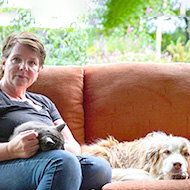
'Generation Pup' owners with cats surveyed.
Dogs Trust has released findings from its ongoing Generation Pup research on how pet owners have introduced their new puppies to existing cats in the household, ahead of National Cat Day on 29 October.
The charity is keen to understand the relationship between the two animals, in order to reduce the number of people who have to give up a pet because of behavioural issues, and to ensure that both animals are comfortable and content.
Of the Generation Pup cohort, over a quarter of the puppies (26.7 per cent) joined households with at least one cat.
Only 40.2 per cent of owners introduced their puppy to the existing household cat gradually, and the remaining owners introduced them during the first day.
Most of the puppies behaved by playing, being over-excited and chasing the cat, these behaviours are likely perceived by the puppy as friendly, but may not be perceived as such by the cat.
The puppies were more likely to remain calm and uninterested if they were introduced to the cats under 12 weeks old, or if they lived in a household with another dog.
Owner expectations differed depending on the owners' introductory styles, those who did owner-led, gradual introductions anticipated amicable relationships between pets, while those who lets pets introduce themselves did not.
Dr Sara Owczarczak-Garstecka and Rachel Kinsman, who are leading the study, said: “Cats and dogs are extremely popular pets, and although they can live amicably together, understanding their relationships is highly important because the quality of the relationships can impact both animals’ welfare and potentially the owners’ wellbeing too.
“Owners for both pets need to understand cat and dog interactions to bust the myth that they don’t get along with each other. They also need to be aware of their dog’s and cat’s body language and recognise signs of stress.”
Image (C) Dogs Trust



 The RCVS has announced a new version of its 1CPD mobile app, with enhanced features for veterinary surgeons and veterinary nurses to record their continuing professional development.
The RCVS has announced a new version of its 1CPD mobile app, with enhanced features for veterinary surgeons and veterinary nurses to record their continuing professional development.